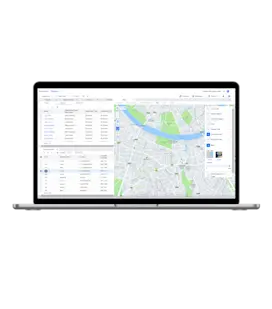Featured in this post
6 Ways To Reduce Logistics Costs With Route Optimization Software
6 Ways To Reduce Logistics Costs With Route Optimization Software
16 Jun 2023
Aptean Staff Writer
With fuel expenses causing headaches, driver shortages increasing labor figures, the rising cost of doing business hitting all industries and customers still wanting more bang for their buck, reducing logistics costs must be top of mind for every transportation operation.
It may sound cliché, but with these challenges dominating the industry, there truly has never been a better time to implement logistics cost management strategies. There are many options open to you: practicing predictive maintenance, negotiating new contracts for overheads, re-evaluating fleet maintenance programs, utilizing telematics to monitor driver behavior and implementing a routing and scheduling system.
In this blog, we're going to dive into that last strategy in more depth, detailing just how advanced route optimization software can help your business reduce logistics costs by 10-30%.
1. Optimize Your Delivery Routes: Reduce Miles and Fuel Consumption
The first way to reduce fleet costs with route optimization software is in the name—optimize your routes. Deciding which route your vehicles should take to the delivery destination is not always as simple as choosing the shortest distance—physical height, weight and load-type restrictions, one-way streets, roadworks or congestion caused by local events can make the shortest distance route impossible.
The impact felt by these factors is then compounded when planning a multi-drop route as extra miles and time incurred affect the arrival times of subsequent deliveries. With advanced software, route optimization algorithms, coupled with detailed mapping options, calculate the best route for your vehicles in seconds. Comparing the distances between each delivery point and your warehouse, the system creates a feasible route sequence that will ensure minimum mileage and fuel consumption while still meeting all of your customer, driver and regulatory requirements.
By optimizing the drop sequence and route, advanced routing systems like Aptean Routing & Scheduling can increase the number of drops per vehicle and reduce the number of trips required to complete the day’s deliveries. This can result in substantial cost savings including fuel consumption, ongoing vehicle maintenance costs and driver wages.
2. Cut Your Planning Time: Free Up Staff and Offer Later Order Cut Off Times
With so many factors and variables to consider for each delivery, transport planning can be a time-intensive job. And if you're doing it manually, relying on spreadsheets and the knowledge of your planners, the results can be inefficient and sub-optimal. But with route optimization software, you can cut your planning time from hours to minutes with just a few clicks—and improve the accuracy of route at the same time.
With advanced routing and scheduling solutions, the software is configured to your business needs as standard, with vehicle types and sizes, loading times, delivery restrictions, meal breaks, and pre-agreed delivery time windows.
By cutting your planning time to just a few minutes, you can streamline your planning team or redeploy staff to focus on higher-value tasks. For example, planners have more time to prepare for seasonal demand fluctuations and investigate alternative transport strategies; you can use your transport team’s expertise and knowledge to improve efficiency further, saving money and miles.
In addition, with less time spent planning your routes and schedules, order cut off times can be relaxed, often resulting in more orders being placed and fulfilled each day—decreasing your cost per drop. For many businesses, those extra hours gained equate to better use of vehicle capacity, helping to manage fluctuations in volumes or business growth without the need for additional trucks.
3. Maximize Vehicle and Fleet Utilization: Increase Drops per Vehicle and Reduce Agency Vehicle Requirements
As your transportation operation grows, the opportunity for inefficiency can increase too. Over reliance on hire vehicles to cope with extra demand and under-utilized own-fleet vehicles can often prove costly, but it doesn’t have to be this way. Luckily, implementing routing and scheduling software can help you educe logistics costs by maximizing utilization of your fleet resources.
With the right system powering your operation, you can often achieve a higher number of drops per trip by optimizing your drop sequence—cutting out unnecessary miles and taking advantage of backhauls/multi tripping to minimize empty running. This, in turn, can allow you to reduce the number of vehicles you need in your fleet, take on more business using your existing resources and ensure agency resources are only used where necessary, reducing your cost per drop.
If you have a fleet of mixed vehicle sizes, advanced routing technology can allocate loads based on pre-defined rules specific to your business to help further increase the number of drops per vehicle.
To help you reduce transport costs further, Aptean's software enables you to prioritize allocating work to your own fleet before using expensive agency resources, ensuring your vehicles are not sitting at the depot while you pay for a hire vehicle and driver.
4. Improve Planning With Real-Time Data: Compare Planned vs. Actual Schedules
Ensuring your transportation planning is optimized for efficiency is important, but what happens out on the road can have a massive impact on whether you reach your cost savings goals. Without visibility, opportunities for further cost reduction through improved planning are often missed.
By linking your vehicle tracking systems with live routing tools, like Aptean Route Execution, you can review planned vs. actual activity reports. This highlights areas where costs could be cut simply by amending your planning parameters. For example, if there is excessive slack in the plan you may be able to reduce the planned unloading time by 10 minutes which could mean that an extra drop can be added to the trip.
By giving your transport route planners visibility of real-world activity they can refine planning parameters for a more realistic and cost-efficient schedule. And the best part? You can do this over and over as you collect more data, ensuring you're consistently optimizing your transport operation and creating a continuous improvement loop.
5. Improve Reliability: Generate Consistently Accurate Arrival Times and Reduce Failed Deliveries
Accurate and realistic delivery times are crucial to controlling transport costs. Too much slack in your unloading time parameters could result in under-utilized trucks. And just as important—not allowing your drivers enough time to unload before the next delivery is due could cause failed deliveries later in your schedule.
With advanced route optimization software, the emphasis is on ensuring your plan is feasible in the real world. You may be able to cut a truck from your fleet by allocating an extra five drops to every route, but if there isn’t enough travel time allocated between drops or hours available in the driver’s shift to achieve those additional drops, then you will be failing deliveries and losing more money than you save in the long run.
Aptean’s route optimization algorithms calculate exact times and distances between each of your deliveries, factoring in the maximum speed of the vehicle, additional time required for unloading and driver meal breaks. This extra level of detail means you can confidently offer delivery time windows to your customers and ensure your vehicles are fully utilized.
Enhanced mapping options enable you to improve your predicted arrival times to include average road speeds and route restrictions, allowing you to maximize delivery volumes on every route and reduce your costs.
6. Model Business Changes: Estimate Cost Savings Based on Historic Routing Data
Every day your route planning system and vehicle tracking devices collect valuable data about your operation. So why not use that information to make educated decisions about your business?
With Aptean's strategic route planning functionality you can use your historic routing and scheduling data from daily activities to model and analyze the cost implications of alternative transport strategies or business growth.
Without interrupting your daily transportation scheduling operations, you can set up a copy of your base data to ask "what if..." questions and reflect on your current processes. Then all you have to do is experiment with your parameters—such as vehicle capacity, warehouse location or loading/unloading times, to get an immediate comparison of fleet requirements, total miles, total driver hours and operating costs.
And because the system is using your existing business rules and historical data as a base, you can be sure that the operational and cost savings are specific to your business rather than being based on industry averages and estimates.
Reduce Logistics Costs With Aptean Routing & Scheduling Software
In an industry where margin is everything and costs only continue to rise, investing in the right route optimization technology can help safeguard your profitability and business growth by reducing your transport costs from day one—as well as helping you implement strategies for future savings, too.
And with Aptean's advanced platform the benefits of route optimization don't stop there. Our software can help you master logistics complexity with tools and functionality to improve your operational visibility and control, minimize your carbon footprint and enhance your customer service.
So, are you ready to transform your transport operation with Aptean Routing & Scheduling? Contact us today to chat with one of our experts or schedule a demo.
Alternatively, if you still have more questions, you can check out our route planning software FAQs, or try our fleet savings calculator to see how you can reduce logistics costs with route optimization software.
Related Content





Ready to start transforming your business?
We've got the specialized TMS solutions you need to conquer your industry challenges.



